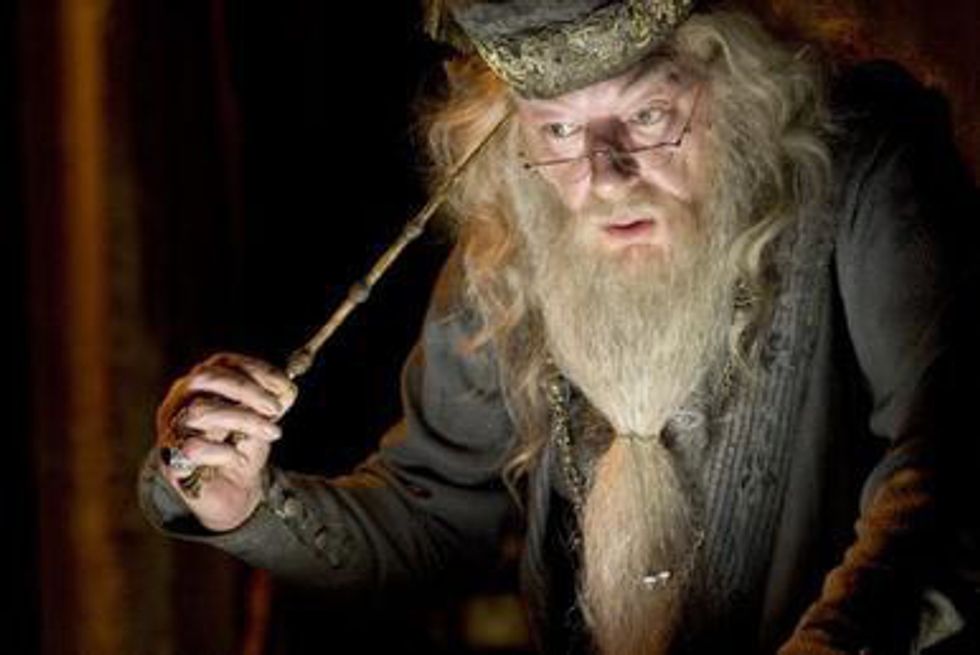I grew up a die-hard Harry Potter fan. As in, I had read the first four books by the time I finished first grade, and I re-read them each Christmas and summer break, adding the fifth, sixth and seventh books into my cycle as soon as they were published. (Yes, I was the epitome of a nerd, and yes, I was teased about it.) I kept re-reading them until I hit junior high and simply didn't have enough time for that much reading anymore. But in those years, I managed to thoroughly wear my copies out, complete with stains, missing covers and torn, taped and re-taped pages. (If you need proof, those are my books in the cover photo.)
If you're a Muggle and you're starting to get a little nervous about reading any more of this article, don't worry; this one's definitely for you, too. In fact, it's mainly for you.
I think a lot of people who aren't interested in or even flat-out dislike the Harry Potter series have a very skewed perception of it. They glance at the books or catch snatches of the movies and assume that they are solely, at best, nonsensical, or, at worst, evil sorcery.
Well, I'm here to tell you that those assumptions are completely false. There's so much more to Harry Potter than spells and wands and a boy with a scar. I wouldn't have kept re-reading those worn-out words if that was all.
Instead, Harry Potter is about learning to see people as more complex than good or bad. It's about selflessness and sacrifice, compassion and courage. It's about coming of age and defining yourself by your choices. It's about admitting fear without being overcome by it. It's about believing that somehow evil can be conquered, even when there's nothing to base that belief on. It's about love that lasts beyond death.
If I don't have you convinced yet, here's a brief explanation of three aspects of the Harry Potter series that I absolutely love (and that I learned from).
1. The entire wizarding world.
I know this is a very broad category, but that's because of the vastness of the world that J.K. Rowling created! (I admire her so much.) If you haven't read the books or at least seen the movies, then you probably have no idea what I'm talking about. But if you have, are you not also amazed by the amount of thought she put into it? From dividing magic into subjects like Transfiguration and Herbology, to thinking of spells like wingardium leviosa and expecto patronum, to developing a complicated sport played on broomsticks, to designing a wizarding bank and currency, to crafting beverages like butterbeer and candy like chocolate frogs and Bertie Bott's every flavor beans, to everything else in between-- she truly didn't leave a single element out.
The world is incredibly, painstakingly detailed, but all of these components are carefully woven in throughout the books so that you're not too confused or overwhelmed by the newness of it all. If that's not talent, I don't know what is.
2. The wisdom.
Albus Percival Wulfric Brian Dumbledore is, of course, the very image of wisdom in the Harry Potter series. (To catch you Muggles up to speed, he is, along with the Headmaster of Hogwarts School of Witchcraft and Wizardry, one of Harry's greatest mentors throughout the series.) He gave Harry timeless advice that resonates within readers. (I may or may not have slipped a couple of his quotes into my high school valedictory speech.) For example:
“It is our choices that show what we truly are, far more than our abilities.”
Let those words sink in for a minute. Profound, right? There is wisdom like that throughout all of the books, and a solid 95 percent of it is applicable beyond the wizarding world. (Fellow Potterheads, you have to agree that knowing to wear earmuffs when repotting baby Mandrakes isn't exactly relevant to our daily lives.)
Even if these lessons aren't spoken, they're being shown through the characters' actions. Lessons in forgiveness, in loyalty, in selflessness, in love. I could go on, but you should probably just read (or reread) the books.
3. The friendships.
I don't think a single picture can actually do justice to the bond between Harry, Ron and Hermione. The trio share an epic friendship, but it is by no means perfect. That's the beauty of it. Between the three of them, they struggle with jealousy, frustration and telling half-truths. But when it matters most, they have each others' backs every time.
Friendship probably could have been included in the previous section about wisdom, but I felt that it deserved a category of its own. After all, the relationships form such an integral part of the series. Although Harry, Ron and Hermione immediately come to mind, there are many more flawed yet strong friendships: Fred and George Weasley, Harry and Sirius Black, Dumbledore and Snape, Hagrid and the trio -- the list goes on. Each of them teaches us something different, whether it's about recognizing someone's strengths or looking beyond someone's past.
To wrap up, the point I've been trying to make all along is that these seven books truly are magical, but that has nothing to do with the spells and wands and everything to do with the values they teach.
I'll admit it, the world and the characters and the story are what captured my heart. But even if there comes a time when I can no longer rattle off the seven Horcruxes, recite Dumbledore's full name or recall all of the Hogwarts ghosts, it's what those books taught me about life that will forever be in my mind.























